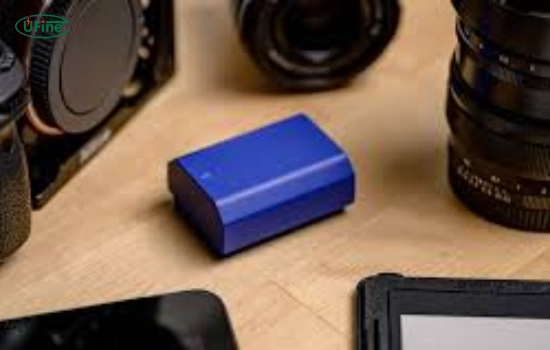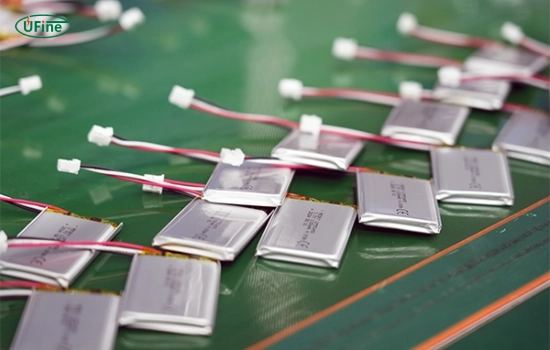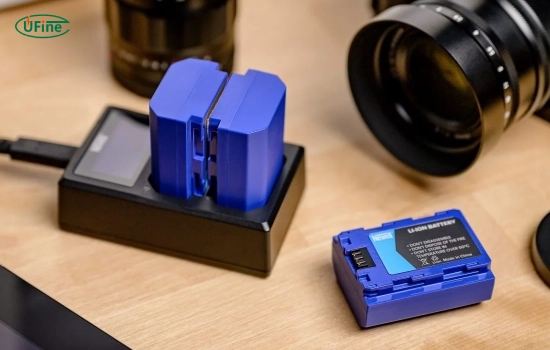A camera battery is a rechargeable power source designed for DSLR, mirrorless, and video cameras. Whether you’re shooting photos or recording 4K video, the right battery ensures uninterrupted performance. This guide explains lithium-ion (Li-ion) vs nickel-metal hydride (NiMH) batteries, how to extend battery life, and tips to choose the best camera battery for your needs.
Part 1. What is a camera battery? Types and uses explained
Camera batteries are rechargeable power sources that supply energy to cameras and other photographic equipment. They come in various types, each with unique characteristics and applications. The most common types include:
- Lithium-Ion (Li-ion): Li-ion batteries, known for their high energy density and lightweight design, are the most popular choice for modern digital cameras. They can be recharged multiple times without significant loss of capacity and offer long-lasting performance.
- Nickel-Metal Hydride (NiMH): These batteries offer a higher capacity than older nickel-cadmium batteries and are more environmentally friendly. Modern NiMH batteries, especially low self-discharge (LSD) versions, retain their charge longer when not used, making them suitable for cameras.
- Nickel-Cadmium (NiCd): Environmental concerns and the memory effect, which requires fully discharging NiCd batteries before recharging, have led to their rare use in cameras today. More efficient battery types have largely replaced them.
- Lead-Acid Batteries: Lead-acid batteries are heavy and less portable but provide substantial power. Photographers use them in larger, professional-grade equipment or external power sources rather than consumer-grade cameras.
Understanding these types is crucial for selecting the right battery for your camera.
Lithium-ion vs Nickel-Metal Hydride: Which is Better?
| Feature | Li-ion | NiMH |
|---|---|---|
| Energy Density | High | Medium |
| Weight | Light | Heavy |
| Best For | DSLR, Mirrorless | Budget Cameras |
Part 2. How do camera batteries work?
Camera batteries operate on the principle of converting stored chemical energy into electrical energy.
- Chemical Reactions: Inside the battery, chemical reactions occur between the materials (like lithium and cobalt in Li-ion batteries) to produce electrons.
- Voltage and Capacity: The voltage of a battery (usually between 7.2V and 14.8V for cameras) indicates how much power it can deliver, while the capacity (measured in milliamp hours, mAh) indicates how long it can provide that power.
- Discharge and Recharge: The camera’s battery discharges as you use it. Plugging it into a charger reverses the chemical reactions, restoring the battery’s energy.
Part 3. Choosing the right camera battery
Selecting the right camera battery involves several considerations:
- Compatibility: Ensure the battery is compatible with your camera model. Check the manufacturer’s specifications for the correct type and voltage.
- Capacity: Look for batteries with higher mAh ratings for longer shooting times. A battery with 2000mAh can power your camera for a longer duration than one with 1000mAh.
- Weight and Size: A lighter battery with a handheld camera can reduce fatigue during extended shoots.
- Brand Reliability: Opt for batteries from reputable manufacturers to ensure quality and safety.
Part 4. How to maintain your camera battery?
Proper maintenance can extend the life of your camera battery:
- Regular Charging: Avoid letting your battery completely discharge before recharging. This can lead to a shorter lifespan, especially for NiMH and NiCd batteries.
- Storage Conditions: Store batteries in a cool, dry place. Avoid exposing them to extreme temperatures, which can damage the cells.
- Cleaning Contacts: To ensure a good connection with the camera, keep the battery contacts clean. Use a soft cloth to wipe away dirt or corrosion.
- Avoid Overcharging: Although most modern chargers prevent overcharging, you should still unplug the charger once the battery is fully charged.
Common Myths About Camera Batteries
There are several misconceptions about camera batteries that can lead to poor practices:
- Myth 1. You Should Always Fully Discharge Your Battery: This differs from Li-ion batteries, which perform better when charged frequently.
- Myth 2. All Batteries Are the Same: Different batteries have varying chemistries and performance characteristics. Always use the recommended battery for your camera.
- Myth 3. Cheap Batteries Are Just as Good: While they seem like a bargain, low-quality batteries can lead to poor performance and potential damage to your camera.
Part 5. How to charge a camera battery correctly: 5 Pro tips
- Use the manufacturer’s charger for optimal voltage.
- Avoid charging overnight to prevent overcharging.
- Charge at room temperature (20-25°C).
- Partial charges are better than full cycles for Li-ion.
- Clean battery contacts monthly with a dry cloth.
Part 6. Signs your camera battery needs replacement
Recognizing when to replace your camera battery is essential for uninterrupted shooting:
- Decreased Runtime: If you notice a significant drop in battery life, it may be time for a new one.
- Physical Damage: Cracks, swelling, or leaks indicate that you should replace the battery immediately.
- Charging Issues: If your battery fails to hold a charge or takes longer than usual, it may be nearing the end of its life.
Part 7. What are the key differences between lithium-ion and nickel-metal hydride batteries for video cameras?
Regarding video cameras, choosing between lithium-ion (Li-ion) and nickel-metal hydride (NiMH) batteries can significantly impact your shooting experience. Here are the key differences:
- Energy Density: Li-ion batteries typically have a higher energy density, meaning they can store more energy in a smaller and lighter package compared to NiMH batteries. This is particularly beneficial for video shooting, where longer runtimes are essential.
- Self-Discharge Rate: NiMH batteries tend to have a higher self-discharge rate, which means they lose charge more quickly when not in use. Li-ion batteries retain their charge for extended periods, making them more reliable for spontaneous shoots.
- Weight: Li-ion batteries are generally lighter than NiMH batteries, which is advantageous for handheld video cameras, reducing the overall weight of your gear.
- Charging Time: Li-ion batteries usually charge faster than NiMH batteries, allowing you to get back to shooting sooner.
- Cycle Life: Li-ion batteries can typically handle more charge cycles (the number of times a battery can be charged and discharged) than NiMH batteries, which means they can last longer overall.
Part 8. What are the benefits of using a high mAh rating battery for prolonged video shoots?
Using a battery with a high mAh (milliamp hours) rating offers several advantages for video shoots:
- Extended Runtime: A higher mAh rating means the battery can provide power for a longer duration. This is crucial for video shoots where you might not have the opportunity to change or recharge batteries frequently.
- Reduced Downtime: A high-capacity battery can minimize interruptions during your shoot, allowing for a more seamless filming experience. This is particularly important for events or situations where capturing every moment is vital.
- Better Performance Under Load: High-mAh batteries can better maintain their voltage levels under heavy loads, essential for video cameras that require consistent power to operate smoothly.
- Fewer Battery Swaps: Using a battery with a higher capacity reduces the need to carry multiple spare batteries, simplifying your gear setup and making it easier to manage during shoots.
Part 9. Tips for extending camera battery life
To maximize your camera battery’s lifespan, consider the following tips:
- Turn Off the Camera When Not in Use: This prevents unnecessary power drain.
- Limit Use of Flash: Flash photography consumes a lot of power. Use it sparingly to conserve battery life.
- Use Power-Saving Modes: Many cameras have settings that reduce power consumption. Familiarize yourself with these options.
- Keep Spare Batteries on hand. Extra batteries ensure you’re always ready for a shoot, especially during long sessions.
Part 10. FAQs about camera battery
How long does a camera battery last on a full charge?
A DSLR camera battery lasts 500-1,200 shots per charge. For 4K video recording, expect 1-3 hours. Actual runtime depends on LCD usage, temperature, and flash frequency.
Can I use a Nikon battery in a Canon camera?
No. Camera batteries are brand-specific. Using incompatible batteries may damage your camera or void the warranty. Always check manufacturer specifications.
Do lithium-ion camera batteries explode?
Rarely. Lithium-ion batteries are safe if undamaged. Avoid puncturing, overheating, or using non-certified chargers to prevent risks.
How to store camera batteries when not in use?
Store at 50% charge in a dry, room-temperature environment. Avoid full discharge or long-term storage in extreme cold/heat.
Why does my camera battery drain so fast?
Fast draining is caused by cold weather, continuous autofocus, or outdated firmware. Turn off Wi-Fi/Bluetooth and reduce LCD brightness to save power.
Can I charge a camera battery with a power bank?
Yes, if your camera supports USB charging. Use a power bank with 5V/2A output. For non-USB models, buy a portable battery charger compatible with your battery type.
What is the best camera battery for cold weather?
Lithium-ion batteries perform best in cold. Keep spare batteries in an inner pocket to maintain temperature. Avoid NiMH batteries below 0°C (32°F).
How to fix a camera battery that won’t charge?
Clean the battery contacts with a cotton swab and alcohol. If unresolved, try a different charger. Persistent issues indicate a dead battery needing replacement.
Related Tags:
More Articles

Aluminum Air Battery Design: Materials, Assembly & Efficiency Tips
An aluminum air battery uses aluminum and air to generate power. Learn its materials, assembly steps, and tips to boost energy output and efficiency.
7 Advantages of a Heated Lithium Battery in Cold Climates
Looking to power batteries in freezing temps? Heated lithium batteries excel in cold climates. Here are 7 key benefits and how they work.
How to Choose the Best Floor Scrubber Battery for Commercial Cleaning?
Selecting the ideal floor scrubber battery ensures a long runtime, rapid charging, and minimal maintenance for efficient commercial cleaning operations.
Battery for Blower vs Battery for Leaf Vacuum: Which One Should You Choose?
Battery for blower vs leaf vacuum—learn the key differences in power, fit, and runtime to choose the right battery for your outdoor tool needs.
How to Choose the Right Battery for Blower?
Choosing the right blower battery? Consider voltage, capacity, chemistry & usage. This guide helps match the best battery for peak performance.






